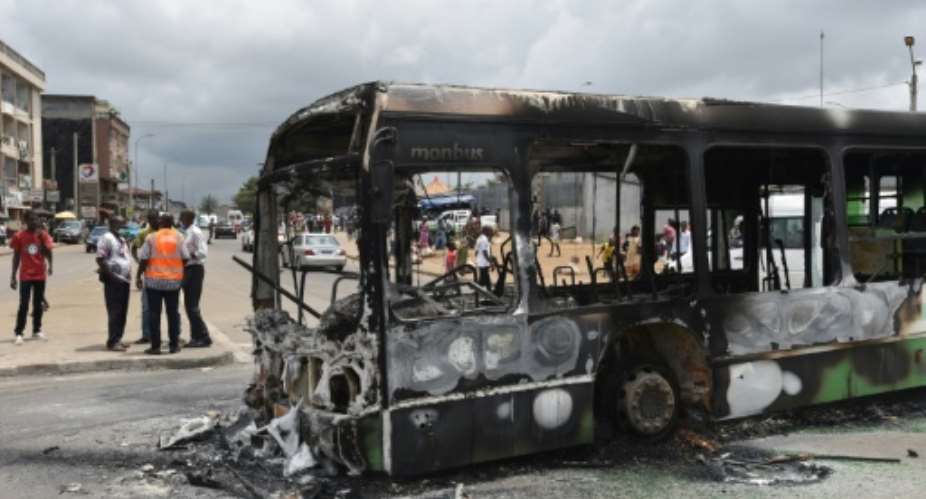Ivory Coast's former foreign minister, who is among 40 candidates barred from running in this month's presidential election, said on Friday he believed the vote would lead to a crisis similar to the low-level civil war that erupted in the country in 2011.
Tensions are running high in the West African country ahead of the October 31 election, with President Alassane Ouattara set to defy protesters who accuse him of abusing a constitutional limit of two terms in office.
"If the elections are held under these conditions, I am afraid that we are heading towards a post-electoral conflict again in Ivory Coast," Marcel Amon-Tanoh told AFP.
Violent demonstrations against Ouattara's candidacy have left around 15 people dead, reviving memories of a crisis that claimed more than 3,000 lives after disputed elections a decade ago.
Meanwhile, several high-profile figures including former president Henri Konan Bedie and former prime minister Pascal Affi N'Guessan have called for "civil disobedience" in recent weeks.
"We must do everything to force Mr Ouattara to sit around a table to discuss, dialogue, negotiate," said Amon-Tanoh, who was a member of Ouattara's inner circle and his chief of staff before becoming foreign minister in 2016. He left the post in March.
 Marcel Amon-Tanoh has called on the international community to "put pressure" on President Ouattara. By Issouf SANOGO (AFP/File)
Marcel Amon-Tanoh has called on the international community to "put pressure" on President Ouattara. By Issouf SANOGO (AFP/File)
"This is the only way to resolve the post-election crisis looming on the horizon," he added.
Amon-Tanoh and others in the opposition have said the planned election is not "credible", and have called for reforms to the electoral commission and the Constitutional Council, Ivory Coast's top court, as well as an audit of voters' lists.
He has also called on the international community to "put pressure" on Ouattara.
The Constitutional Council has rejected 40 of 44 applications to contest the election.
Those barred include Ouattara's predecessor Laurent Gbagbo and former prime minister Guillaume Soro, both of whom played key roles in the crisis that engulfed the country ten years ago.
Both men are living outside the country but retain powerful support at home.
'Imagine what will happen'
Ivory Coast, the world's top cocoa grower, is still scarred by the violence which erupted when Gbagbo refused to cede power to Ouattara.
"In 2010 before the election, there were no deaths. Now we already have deaths, so you can imagine what will happen in 2020 with the current tensions," Amon-Tanoh said.
Re-elected in 2015, Ouattara, 78, announced in March that he would not seek a third term.
 President Ouattara says a 2016 revision of the constitution reset the term limit. By Ludovic MARIN (AFP/File)
President Ouattara says a 2016 revision of the constitution reset the term limit. By Ludovic MARIN (AFP/File)
But he changed his mind after his preferred successor, prime minister Amadou Gon Coulibaly, died of a sudden heart attack in July.
Ouattara argued that a 2016 revision of the constitution reset the term limit to zero -- a view backed by the Constitutional Council.
The International Crisis Group (ICG) on Tuesday called for the election to be postponed and for ballot preparations to be overhauled.
"The chances of this election spawning a serious crisis are high," the independent think tank said.





 Lay KPMG audit report on SML-GRA contract before Parliament – Isaac Adongo tells...
Lay KPMG audit report on SML-GRA contract before Parliament – Isaac Adongo tells...
 Supervisor remanded for stabbing businessman with broken bottle and screwdriver
Supervisor remanded for stabbing businessman with broken bottle and screwdriver
 NDC watching EC and NPP closely on Returning Officer recruitment — Omane Boamah
NDC watching EC and NPP closely on Returning Officer recruitment — Omane Boamah
 Your decision to contest for president again is pathetic – Annoh-Dompreh blasts ...
Your decision to contest for president again is pathetic – Annoh-Dompreh blasts ...
 Election 2024: Security agencies ready to keep peace and secure the country — IG...
Election 2024: Security agencies ready to keep peace and secure the country — IG...
 People no longer place value in public basic schools; new uniforms, painting wil...
People no longer place value in public basic schools; new uniforms, painting wil...
 'Comedian' Paul Adom Otchere needs help – Sulemana Braimah
'Comedian' Paul Adom Otchere needs help – Sulemana Braimah
 Ejisu by-election: Only 33% of voters can be swayed by inducement — Global InfoA...
Ejisu by-election: Only 33% of voters can be swayed by inducement — Global InfoA...
 Minority will expose the beneficial owners of SML, recover funds paid to company...
Minority will expose the beneficial owners of SML, recover funds paid to company...
 Prof. Opoku-Agyemang has ‘decapitated’ the NPP’s strategies; don’t take them ser...
Prof. Opoku-Agyemang has ‘decapitated’ the NPP’s strategies; don’t take them ser...
